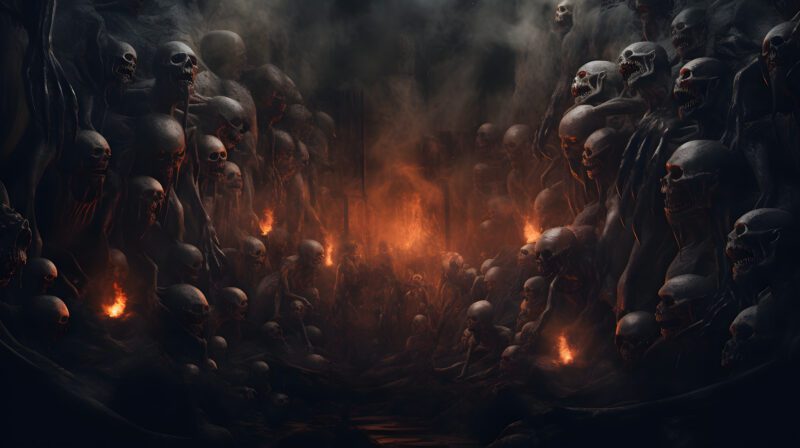
No Other Gods: The Sinister Nature of Idolatry, Part 2
Published February 6, 2025
People don’t give much thought to the problem of idolatry, but since Scripture spends so much time addressing this issue, we should understand what the Bible says about it and how to obey God’s command to have no other gods.
Idolatry is loving, trusting, or desiring something or someone more than or in place of God. All people, whether they claim to be religious or not, are by nature idolaters because everyone puts someone or something in the place of God.
As the command against idolatry informs us (Exodus 20:2-5), God forbids us to have any other gods before Him. Additionally, since our idols almost always take some kind of physical shape, whether in another human being or in some physical object, God highlights the importance of eliminating all images that represent God from our worship.
We now consider the case against idolatry. God had reasons for commanding Israel not to have other gods before Him and not to make and worship idols (Exodus 20 and Deuteronomy 4). We see four reasons in these two passages why we must not worship idols.
The first reason God forbids idolatry is because He is invisible.
In Deuteronomy 4, Moses states that the reason Israel must avoid making graven images or worshiping visible things in the created universe is because they did not see any form of God when they encountered Him at Sinai. G.K. Beale writes, “God had not revealed Himself in any form to Israel, and to portray Him in any degree in the form of any part of creation is to misrepresent Him and thus to commit idolatry.” Israel was not to make any image of God because they would grotesquely distort the nature and beauty of the true and living God.
What’s fascinating about this passage is that God did reveal Himself to Israel, even if He did not do so through their eyes. The emphasis at Mount Sinai instead fell on something invisible, but still understandable – namely, God’s Word. True revelation of God is not accomplished through visible, created things but through the proclamation of the Word of God.
The Lord’s revelation of Himself to Israel at Sinai was meant to be normative for how people should expect God to reveal Himself. Sinai was not the exception to God’s self-disclosure, but the rule. God always manifests Himself to men through the Word. His word is central to worship, and images therefore should not represent God or aid in our worship of Him.
Yet, this all raises an interesting question when we consider the Incarnation of God’s Son because the apostles are quite clear that they saw Jesus with their eyes. Did this event change the meaning of idolatry, such that we could now have images of God or pictures of divine things to aid us in our worship?
The answer is still no. First, the New Testament is clear that Jesus is most certainly the image of the invisible God, the Word made flesh, and a visible manifestation of the revelation of the Father; but the New Testament places the emphasis of the Incarnation squarely on Jesus as the Word of God, not on Jesus’ physical appearance. We must, therefore, continue to focus on what God revealed about Himself and His plan of salvation in Christ through His Word.
Second, the New Testament is clear that the normative situation for Christians is not having seen Jesus during this present age (1 Peter 1:8, John 20:29). While Christ is the image of the invisible God, and God did manifest Himself visibly in the person of His Son, the Lord did not change His normal emphasis in how He speaks to His people through His Word, and no record has been left of the physical appearance of our Lord.
The invisibility of God, then, is the first reason why we must not make or worship idols or make things in creation our gods.
There’s a second reason given, namely that God is jealous.
The second of the Ten Commandments declares that God is a jealous God (Exodus 20:3-5). This attribute is difficult to understand, so we must ask what it means that God is a jealous God, and why that is something demanding of worship.
One reason this attribute is difficult to understand is because jealousy is predominately a negative trait. Scripture often shows that jealousy can be a work of the flesh, which would not be from the Holy Spirit in that context. Jealousy of the flesh is being jealous over something that is not rightfully ours.
The Lord’s jealousy is better defined as God’s zeal for His own glory, which rightfully belongs to Him and is a manifestation of His holy love. God forbid Israel to worship other gods because they were His covenant people under the Law, and their idolatry would provoke His holy, loving jealousy. That jealousy also stands today under the new covenant. We are God’s people by covenant because we have been bought with the blood of Christ. When we are unfaithful to God, we provoke Him to jealousy because we are in violation of our covenant bonds in Christ.
There is a third reason we must not worship idols, and that is because God is Creator.
The passage in Deuteronomy 4:15-19 not only emphasizes God’s invisibility, but His transcendence over all creation. Moses makes the argument here that we must not worship idols because God is Creator, and nothing else is equal with Him in all creation. Everything on earth, in outer space, and in our universe, has been created by God. We cannot, therefore, make gods out of things God made.
God wants us to maintain a clear distinction between Him as the Creator and everything else as creation. When we set up and worship idols, whether silver and gold or invisible in our hearts, we declare that creation is greater than the Creator. This prohibition against idolatry reminds us there is nothing in all creation even remotely close to God’s glory, majesty, and power.
Lastly, God must be God alone with no rivals, because He is Redeemer.
Although God created everything good, Adam sinned and introduced idolatry into God’s good creation– and all creation fell under the Lord’s divine, just curse. God could have condemned the world and humanity and been perfectly just and deserving of worship all the same. However, God, in His grace, mercy, love, did not respond this way to our sin. When His image-bearers aligned themselves with the serpent, God intervened, beginning His great work of redemption.
Because God was Israel’s redeemer, He had a rightful claim on their total and complete allegiance (Exodus 20:2-3). The same is true for new covenant Christians on a much grander scale. Believers should oppose every false god and lofty thing raised up against the knowledge of God because our Lord has freed us from Satan’s tyranny, redeemed us from our sins, made us a people for His own possession, and set His love on us.
As Christians, our hearts’ greatest desire should be to live for God’s glory. We should want to smash everything that rises up to be God’s rival. We should hate the idols that seek our allegiance, or that seek to cause us to love, trust, or desire them in the place of God. The Lord is worthy of our worship because of who He is, and how our hearts should thrill to see that His love and grace moved Him to redeem wretched sinners like us. May we, by God’s grace, tear every idol in our hearts from God’s throne, and worship Him alone.




0 Comments